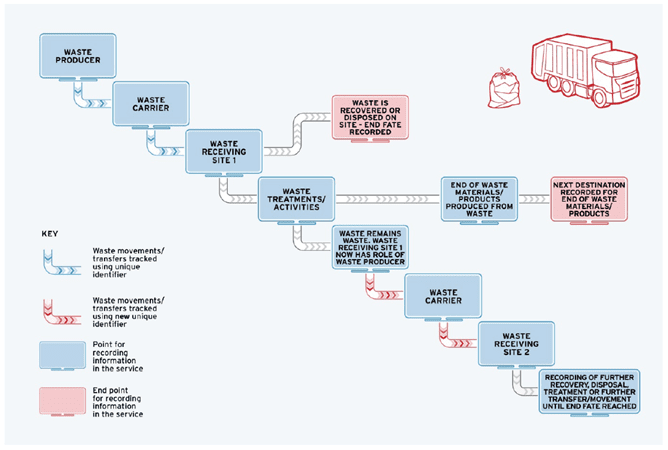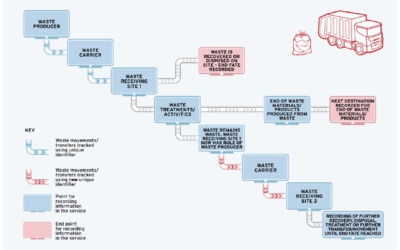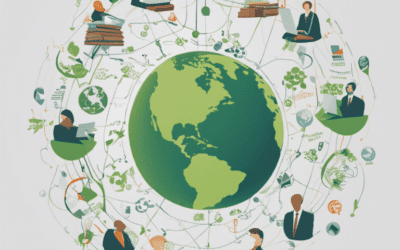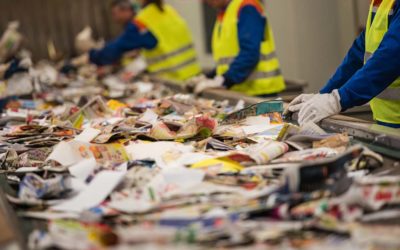 Matthew Gawn
Matthew Gawn
ISB Global, Market Intelligence Report: February 2023
What is Mandatory Digital Waste Tracking?
Mandatory Digital Waste Tracking (MDWT) is policy to help deliver the Resources and Waste Strategy for England designed to preserve material resources by minimizing waste, promoting resource efficiency and moving towards a circular economy in England.
MDWT will provide a comprehensive method of seeing what is happening with waste in the UK.
It will help regulate waste activities in the UK, help business comply with the duty of care of waste materials, help move towards a circular economy, and reduce waste crime.
In short MDWT is designed to offer greater transparency and accessible information on how and where waste is created, who deals with it, what happens to it and where it goes.
Why Implement Mandatory Digital Waste Tracking?
Over 200mt of waste is produced in the UK every year but there is no single comprehensive way of tracking it. This is largely due to the waste resource materials, waste transport, management and descriptions of waste being introduced separately over the last 30 years.
Large amounts of data are not collected or collated centrally. Many systems are paper based or digital but are run by private contractors or government. There is no mandatory legislation to encourage use and take up is low. The result is difficulty in tracking to understand recycling, recovery or disposal.
Linking these systems in one digital platform with underpinning legislation will make it easy to track waste resource material recycling, recovery or disposal. It will make it more difficult to commit fraudulent activity like fly tipping, misclassification of waste exports and illegal waste sites.
The Environment Act 2021 provides the governments across the UK to introduce regulations to establish an electronic system to access and record several aspects of data including:
- Access to data on the waste tracking system
- Information on fees and charges
- Exemptions and alternative requirements for digitally excluded individuals
- Offences and sanctions
Linked Legislation in the Environment Act 2021
Along with Mandatory Digital Waste Tracking, and as part of the 25 Year Environment Plan, there are a number of instruments to help waste resources recycling being implemented currently. As part of the Act they are all designed to work in conjunction with each other. These include:
Extended Producer Responsibility (EPR) – Information on Packaging materials that are recycled and disposed of. (Further reading)
Transfrontier Shipments of Waste (TFS) – Tightening of controls on waste exports and banning exports to non-OECD countries. 17th Jan 2023 – EU Legislation updated.
Collection Consistency – Introduction and standardisation of waste resources material streams collections throughout the UK, a key focus is on food waste collections.
In England a reform of carriers, brokers and dealers of waste resources materials is also planned.
There are also planned reforms in hazardous waste classification to aid in identification and to encourage producers to make better use of the waste hierarchy.
As yet there has been multiple delays with the legislation and when multiple bills will deployed and acts and legislation. It is expected that the bills mentioned here will be enacted in law between 2023-24.
Current Recording of Waste Transfer Notes
Commonly know as ‘Duty of Care’ requirements, the data is recorded and collected using Waste Transfer Notes for non-hazardous materials and Consignment Notes for hazardous materials.
This only applies to household waste when transferring to an authorised person for additional collection that a municipality provides.
There are additional requirements for those that produce products and materials from hazardous waste. Everything containing Persistent Organic Pollutants (POPs), products and materials that do not break down naturally in the environment. There is no current system for tracking POPs.
There are over 500,000 exemptions for sites in the UK. This is believed to be widely abused. Without the proposed legislation it makes it very difficult to manage material flows to and from these sites.
How will the MDWT affect waste operations and waste material resources tracking?
Waste Types – Hazardous, Non-Hazardous, Industrial, Commercial and Extractive waste types, including Persistent Organic Pollutants (POPs) will all need to be standardised and tracked under the new legislation. This will ensure that all waste materials are tracked from producers to recycling giving more accurate data on material flows within the UK.
Waste Activities – The waste tracking legislation will be used to capture the full journey from producer to recycling and or disposal point. This journey will be harmonised for a single comprehensive and consistent way to track and that is clear to all stakeholders.
To facilitate the tracking elements for the digital service the waste tracking service will record the following activities:
- Waste transferred to another person on the same or different site. This includes waste transferred to authorised waste carriers.
- Waste imported or exported under Green List Waste Controls
- Waste moved between sites by the same person or company
- Waste treated on site by holder or producer
- Waste that has undergone treatment to ensure that it is ready for reuse, recycling, recover or disposal
- Waste that has been discharged, disposed or recovered through reuse or recycling
- End of Waste products or materials that are at the end of life and produced from waste and transferred to the next destination
Business Waste – A waste carrier will enter the details of the waste movement for the producer. However, the producer or site will need to check that the details are correct at this time. There will be a degree of automation and access as the service progresses.
Household Waste – The waste carrier who is responsible for collecting waste from other than the cyclical municipal collection is responsible for the creation of a digital record. They should give the household a unique identifying number which can be traced for recycling or to ensure the waste resource material has not been illegally processed in anyway.
Local Authorities – Waste from individual households will not require tracking. However, material loads into a receiving site and further recycling from there will need to be tracked. If collections are made from industrial or business premises, this will also require tracking. The MDWT service replaces WasteDataFlow and provides more timely information.
Waste Site Operators – Any site accepting waste requires recording and what is to happen to the waste. There will be sufficient functions in the MDWT app to record handling ensuring compliance with permits license and registrations.
Waste Importers & Exporters – Will be required to record details of waste that will be imported or exported under the Green List Waste Controls. The International Waste Shipments online system will also continue to need to be updated.
Environmental Regulatory Officers – Will have access to the MDWT service app and will have access to timely information on the movement of waste. This will help detect waste that does not meet reach the next stage of the chain and help to identify illegal dumping, stockpiling, changing descriptions (tax avoidance) and unusual patterns that may indicate fraudulent schemes.

What are ISB Global Doing to Help?
As this is an area of expertise, ISB Global are consulting with their client base and users of Waste & Recycling One. To ensure of the continuation of the market leading software Waste & Recycling One, integrated to the MDWT application.
We will be deploying the powerful WR1 Low Code functionality to build a link to the Mandatory Digital Waste Tracking application.
This will use the existing industry standards of powerful master data and transactional data capture features of Waste & Recycling One.
There will also be several areas within the integration, technology, user experience and processes that ISB Global’s Waste & Recycling One adds value and excels at capturing, delivering, reporting and analysing on the transferal of data between applications.
This will continue to build on the most advanced waste management software application in the world, further proving ISB Global’s understanding of the industry and commitment to the digital transformation of the sector and drive to support the realisation of the circular economy by software technologies.
ISB Global will be launching the Mandatory Digital Waste Tracking (MDWT) Application PoC in June 2023.
For more information on the MDWT please check here:




